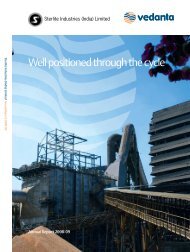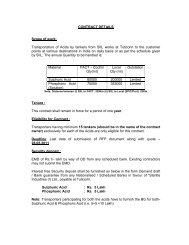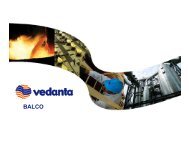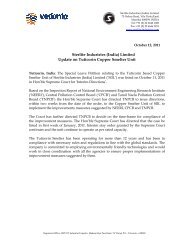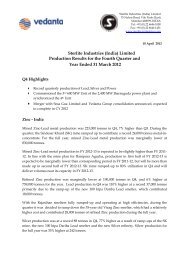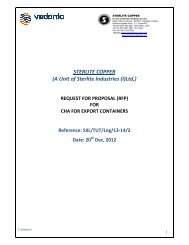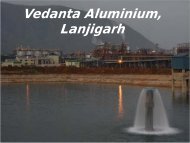Sterlite Industries (India) Limited - Sterlite Industries India Ltd.
Sterlite Industries (India) Limited - Sterlite Industries India Ltd.
Sterlite Industries (India) Limited - Sterlite Industries India Ltd.
Create successful ePaper yourself
Turn your PDF publications into a flip-book with our unique Google optimized e-Paper software.
Principal Raw Materials<br />
The principal inputs of BALCO’s operations are bauxite, alumina, power, carbon, caustic soda and certain other raw materials. BALCO has<br />
in the past been able to secure an adequate supply of the principal inputs for its business.<br />
Bauxite<br />
Bauxite is the primary raw material used in the production of alumina. BALCO sources the bauxite required for its alumina refinery from its<br />
own mines.<br />
Alumina<br />
Alumina is the primary raw material used in the production of aluminum. BALCO currently sources in excess of 72% of its alumina<br />
required for its smelters from third party suppliers on both the <strong>India</strong>n and international markets, including from Vedanta Aluminium, with the<br />
remainder provided by its alumina refinery. The alumina sourced externally is metallurgical grade calcined alumina with a minimum alumina<br />
content of 98.6% on a dry basis. In fiscal 2007, 2008 and 2009, BALCO purchased 384,150 tons, 309,460 tons and 112,017 tons of alumina at<br />
an average price of $378, $398 and $365 per ton, respectively, on a Cost, Insurance and Freight (CIF) basis at the port of Vizag, <strong>India</strong>.<br />
Power<br />
Smelting primary aluminum requires a substantial, continuous supply of electricity. A reliable and inexpensive supply of electricity,<br />
therefore, significantly affects the viability and profitability of aluminum smelting operations. As a result, power is a key input at BALCO’s<br />
Korba facility, where it is provided by two coal-based captive power plants of 270 MW and 540 MW, respectively. Our captive power plants<br />
have historically been dependant upon coal allocations from Coal <strong>India</strong>. In November 2007, BALCO received a coal block allocation of<br />
211.0 million tons for use in its captive power plants. Power for BALCO’s mines is provided by on-site diesel generators. However, if such<br />
allocation is not available, BALCO will continue to source coal from third parties.<br />
Water<br />
Water is also an important input for BALCO’s captive power plants. BALCO sources its water requirements at Korba from a nearby canal,<br />
with the water transported by pipelines. BALCO is currently in a dispute with NTPC regarding the right of way for its water pipeline that<br />
supplies water to its 270 MW captive power plant, which has been built through NTPC premises. Arbitration proceedings commenced on<br />
May 18, 2009 and are ongoing. See “Item 3. Key Information — D. Risk Factors — Risks Relating to Our Business — Our operations are<br />
subject to operating risks that could result in decreased production, increased cost of production and increased cost of or disruptions in<br />
transportation, which could adversely affect our revenue, results of operations and financial condition.”<br />
Carbon<br />
Carbon is an important raw material to the aluminum smelting process. Carbon is used in the process of electrolysis, in the form of cathodes<br />
and anodes, with the latter the biggest component of BALCO’s carbon costs. Anodes are made up of carbonaceous material of high purity. For<br />
pre-baked anodes, green carbon paste made of calcined petroleum coke and coal tar pitch is compacted or pressed into the required form. These<br />
anodes are baked before their use in electrolytic cells, or pots.<br />
BALCO has in-house facilities to manufacture carbon anodes to meet its entire carbon anode requirements. Calcined petroleum coke, coal<br />
tar pitch and fuel oil, which are the key ingredients for the manufacture of carbon anodes, are sourced primarily from the <strong>India</strong>n market. There<br />
is an adequate supply of these raw materials in <strong>India</strong>, though their prices are generally determined by movements in global prices.<br />
Caustic Soda<br />
Caustic soda is a key raw material used to dissolve the bauxite in the alumina refining process. The caustic soda requirement varies<br />
significantly depending on the silica content of the bauxite and the technology employed. BALCO sources its caustic soda requirements from<br />
various domestic manufacturers.<br />
51



